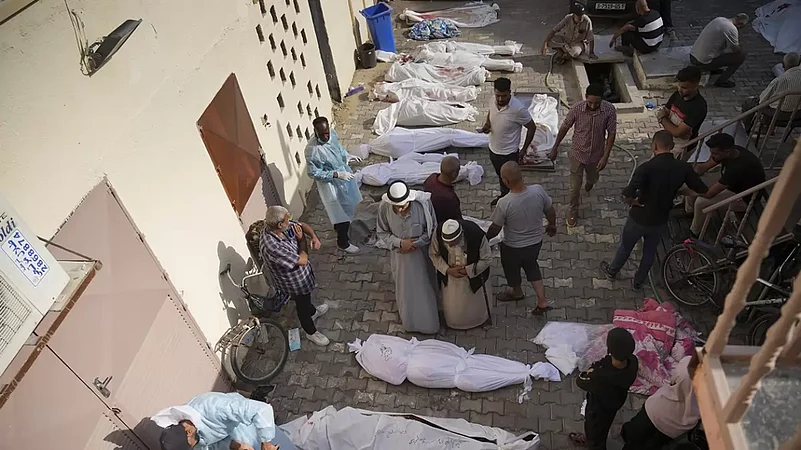Palestinians in Gaza Strip have started wearing bracelets identifying them or writing names on their arms so they may be identified upon deaths, according to a report.
Israel-Hamas War: Palestinians In Gaza Strip Wear ID Bracelets To Avoid Burial In Unmarked Mass Graves, Says Report
The ongoing Israel-Hamas War has devastated the Palestinian enclave of Gaza Strip where local authorities say more than 7,000 have been killed, which include more than 2,000 children, in Israeli airstrikes.

The Israeli airstrikes that began after the Hamas attack on Israel on October 7 have devastated Gaza Strip where local authorities say more than 7,000 have been killed, including more than 2,000 children. Thousands of homes and several schools and medical facilities have also been damaged, with satellite images showing large parts of the territory being levelled.?
The unidentified bodies are being buried in mass graves in Gaza. To avoid such nameless burials where bodies are assigned mere numbers, families in the region have resorted to wearing identifying bracelets or writing names on their bodies, according to a report.?
The report also said that families have split themselves and are living separately to avoid dying in a single strike.?
In the?El-Daba family in Gaza City, the wife is living with two boys and two girls in the northern part of the city and the husband is living with three other children in the southern part of the city, according to Reuters, which adds that they have also tied blue bracelets to their arms so they may be identified in case they die.?
"Other Palestinian families were also buying or making bracelets for their children or writing their names on their arms," reported Reuters.
The report further said, "Mass burials have been authorized by local Muslim clerics. Before burial, medics keep pictures and blood samples of the dead and give them numbers."
Israel began carrying out airstrikes in Gaza after Hamas mounted an all-out attack on Israel on October 7 and killed at least 1,400 and injured over 5,300. It was the worst attack on Israel?and the worst single-day toll on Jews since the Holocaust. While Israel has taken down leaders and facilities of Hamas, a designated terrorist organisation, in airstrikes in Gaza, widespread civilian casualties have also taken place. The latest figures by Gaza authorities say at least 7,300 have so far been killed, including at least 2,913 children, and more than 18,000 have been injured.?
The humanitarian situation in Gaza is also very poor as the territory is short of food, water, electricity, and fuel, which has also affected the functioning of medical facilities. The ground invasion of Gaza which appears to be imminent is expected to make the situation worse as months of intensive pitched urban battles are expected in Gaza, which is infested with a wide network of underground tunnels of Hamas and military infrastructure and launchpads tucked between civilian neighbourhoods.?
Gaza is one half of the envisioned State of Palestine, with the other being the West Bank. While the internationally-recognised Palestinian Authority (PA) has partial governance in?the West Bank, Hamas captured Gaza in 2007 after it drove out Fatah which runs the PA. Following the takeover of Gaza by Hamas, Israel and Egypt jointly implemented a blockade of the territory that has led to the region being termed as the largest 'open-air prison' in the world. Once the war broke out on October 7, Israel also implemented a ground blockade and cut of electricity and water supply to the region. Gaza depends on Israel for around a third of its water supply. So far, only water supply in southern Gaza has been restored.?
-
Previous Story
 15 People Including 9 Children Of Palestinian Family Killed In Israel’s Latest Assault
15 People Including 9 Children Of Palestinian Family Killed In Israel’s Latest Assault - Next Story


















